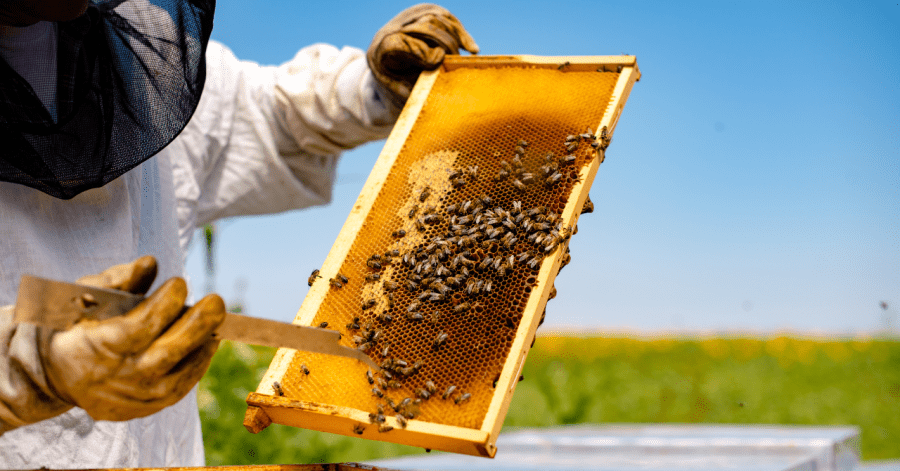“As an engineer, I found it astonishing how humanity could invent a way to send people to the moon, but cannot find out how to stop the honey bee from going extinct,” remembers Sergey Petrov, co-founder, and CEO of Pollenity.
That is how around 10 years ago, Petrov got motivated by the complexity of this problem. Bees are the most important mechanism for the pollination of our food as they sustain biodiversity and ensure food security. Around 85% of plant species and 75% of the food production in Europe depend on pollination by bees. The economic value of this process is estimated to be around €14B per year.
Sergey Petrov came up with the solution to digitize beehives and allow beekeepers to enter the 21st century just as all the rest of the stakeholders in the agricultural industry. His company Pollenity specializes in solutions for the beekeeping industry and provides beekeepers with software and sensors to optimize their work and brings more transparency to the honey supply chain. Founded in 2015 by Sergey Petrov, Pollenity which was previously known as Bee Smart Technologies, develops a beehive monitoring system (Beebot), a smart hive (uHive), and a platform for fair and sustainable honey trade.
The Recursive met with Sergey Petrov to learn more about the solution and recent developments around the company.
“Honey is the third most adulterated food product in the world. People consume less and less of it as they don’t have trust in the market. On the other hand, honey has been used for thousands of years not only as food but also as а medicine. Consumers are aware of that, but struggle to find real honey and end up buying alternatives to the real product,” Petrov highlights.
The three pillars of Pollenity – science, technology, and innovation in beekeeping
Pollenity is based on three main pillars – producing high-tech beehive systems, introducing an innovative business model in the honey supply chain, and collaborating with universities and scientists.
The first product of Pollenity, the Beebot, is a device that turns every beehive into a smart hive. It has IoT sensors that capture data about the temperature and humidity. The Beebot performs analysis every 15 minutes, compiles the information into reports, and sends it to the cloud three times a day. Beekeepers can then access the data from anywhere, on any device for remote monitoring of their beehives. The temperature and humidity analysis tell a lot about the health of the bee colony and any reported fluctuations are a clear sign that something is wrong. Pollenity is also currently working on advanced sound analysis algorithms that would notify the beekeepers when a queen has stopped laying eggs, or a new queen is born.
For the beginner and inexperienced beekeepers who want to understand the dynamics of their bee colonies and the conditions inside their beehives, Pollenity has developed uHive. It is a smart hive that monitors the temperature, humidity, and movement of bees, to alert the beekeeper if there are some early indicators that require attention.
Through uHive, beekeepers contribute to science, as the device shares valuable information with scientists working to save bees. Additionally, Pollenity contributes to the advancement of science in the beekeeping industry by participating in a large European R&D consortium Hivepolopis, together with six European universities. Pollenity is also a partner of the World Bee Project which is the first private initiative in the world that remotely monitors bees to research the global pollination crisis.
The company also aims to support European beekeepers with its “Adopt a hive” platform by creating a fair and sustainable market for their production. The idea is to allow consumers to support small beekeepers by adopting a hive and subscribing to receive monthly deliveries of high-quality honey.
“We want to bring transparency over the honey supply chain and to remove the middle man who takes the money out of the hands of the producers. When we add a new partner to the Adopt a hive program, we virtually introduce him to the digital retailing of honey. We sign a contract under which the producer agrees to supply Pollenity with pure honey. Then we test the honey, package it and bring it to the door of the final consumer,” Sergey explains.
The future of the smart hive
Petrov began developing the first prototype of his smart hive back in 2014. One year later, he founded Bee Smart Technologies with an office in the United States. Over the years, the startup has received many significant recognitions such as becoming a global finalist in the Chivas the Venture 2016, raising a pre-seed investment from the accelerator of NEVEQ 2, Eleven Ventures, and winning a grant from the European Commission.
Up to date, the company has distributed honey to more than 20K clients and has made €200K euros in sales in 2021. This makes it one of the leading honey retailers in Bulgaria. Besides providing honey to retail consumers, Pollenity works with over 120 corporate partners in Bulgaria.
Stay tuned for more news from Pollenity in the coming month!







